How hospice care addresses the unique needs of veterans
July 25, 2025
Honoring Service at End of Life: Veteran-Focused Hospice Care

Understanding How Hospice Supports Veterans in Their Final Journey
Hospice care plays a vital role in providing comfort and dignity to veterans facing terminal illness. Recognizing the unique physical, emotional, social, and spiritual needs of those who have served, specialized hospice programs aim to deliver respectful, culturally sensitive, and comprehensive support. This article explores how hospice care is tailored to honor the sacrifices of veterans, addressing their distinct healthcare requirements and fostering a sense of closure and appreciation.
Comprehensive Care Addressing Physical, Emotional, Social, and Spiritual Needs
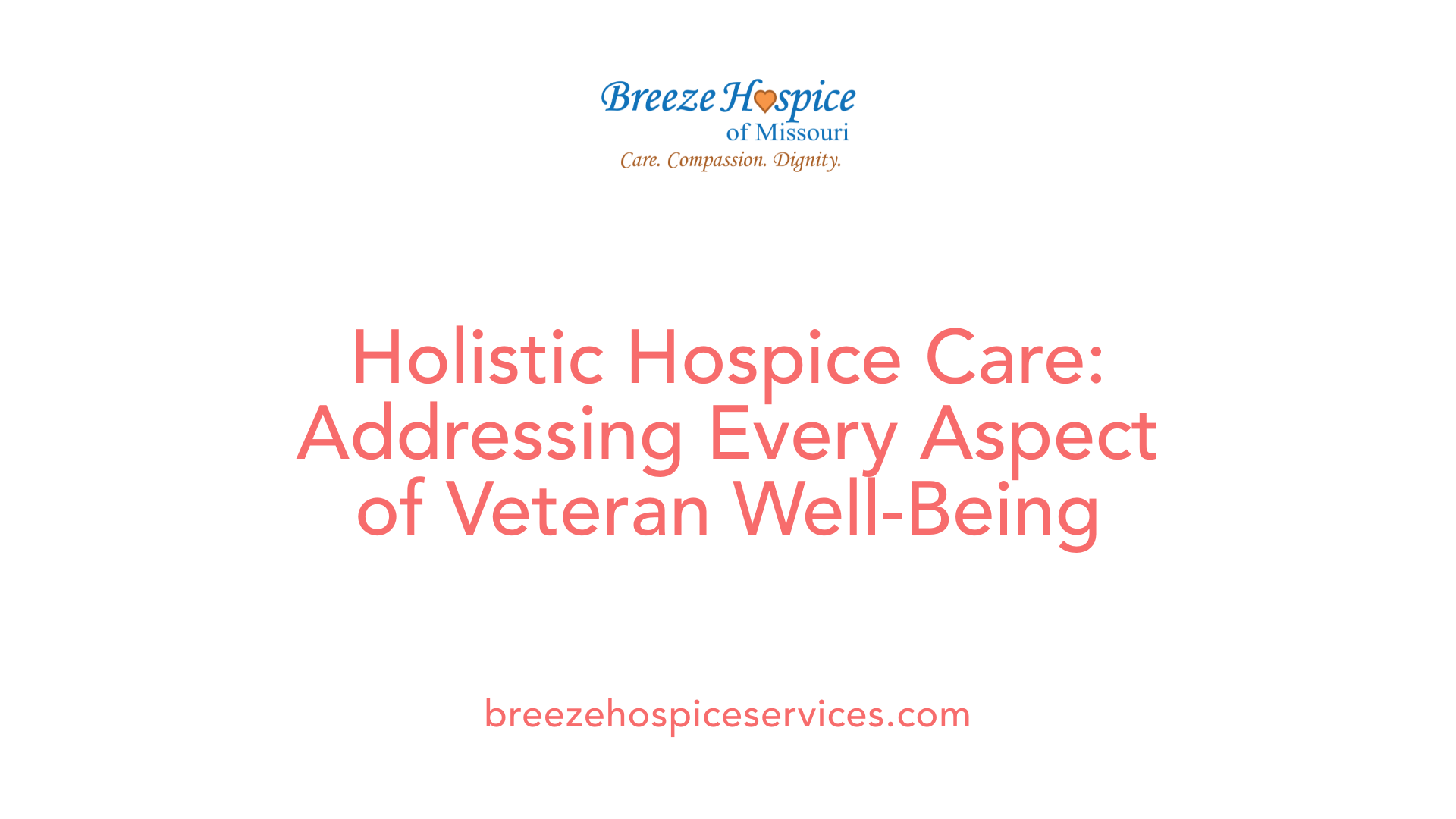 Hospice care tailored for veterans provides a holistic approach that meets their unique health and emotional needs. It emphasizes managing physical symptoms such as chronic pain, respiratory issues, and traumatic injuries through specialized medication management and comfort measures like music and art therapies.
Hospice care tailored for veterans provides a holistic approach that meets their unique health and emotional needs. It emphasizes managing physical symptoms such as chronic pain, respiratory issues, and traumatic injuries through specialized medication management and comfort measures like music and art therapies.
Beyond the physical, emotional support is a priority. Veterans often face mental health challenges like PTSD, survivor’s guilt, and depression. Hospice programs incorporate trauma-informed care and counseling aimed at processing trauma, alleviating symptoms, and promoting emotional well-being. For spiritual needs, chaplains and support services help veterans explore faith, resolve guilt, and find peace.
Veteran recognition activities are central to honors and dignity. These include pinning ceremonies, flag presentations, and ‘This is Your Life’ stories that celebrate service and foster pride. Additionally, veteran-to-veteran support networks and volunteer programs create camaraderie, allowing shared understanding among those who served.
Care teams trained in military culture ensure respect for veterans’ values, fostering trust and culturally sensitive communication. Access to VA benefits and resources, along with collaboration with veteran organizations, enhances support by addressing legal, financial, and health-related concerns.
Overall, programs like We Honor Veterans champion respectful inquiry, compassionate listening, and recognition, making sure veterans’ end-of-life experiences preserve dignity, honor service, and support emotional and spiritual healing. This comprehensive approach helps veterans and their families find comfort, closure, and peace during life’s final chapter.
Specialized Hospice Programs and Veteran-Centric Services
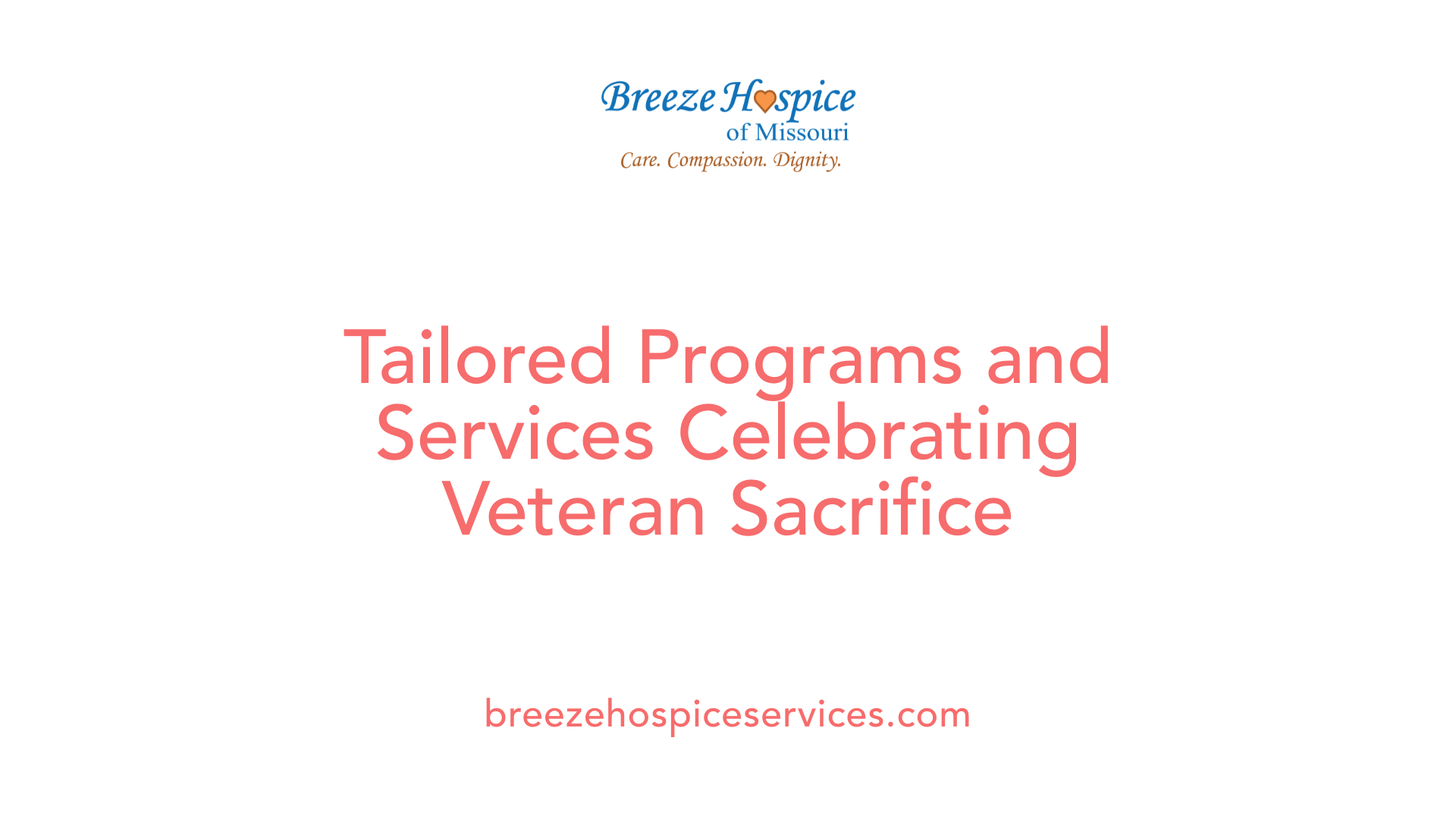
What specialized programs and services are available within hospice care for veterans?
Hospice care for veterans is uniquely tailored to address the complex physical, emotional, and psychological challenges resulting from military service. Many programs focus on managing conditions such as post-traumatic stress disorder (PTSD), survivor guilt, chronic pain, and injuries acquired during combat or service.
A prominent example is the "We Honor Veterans" program, a collaboration between the Department of Veterans Affairs (VA) and the National Hospice and Palliative Care Organization (NHPCO). This initiative provides educational resources, recognition activities, and community outreach to honor veterans and ensure they receive respectful, veteran-specific care.
Hospice teams are trained in military cultural competence, helping staff understand veterans’ unique values, communication styles, and health issues. They may offer emotional and spiritual counseling, veteran support groups, and recognition events such as pinning ceremonies and flag presentations.
Specialized services also include assistance with navigating VA benefits, veteran-to-veteran volunteer programs, and trauma-informed care approaches that specifically address issues like traumatic brain injuries, chemical exposures, or service-related disabilities. These efforts aim to improve quality of life, foster dignity, and honor veterans’ service during their final days.
Additional community partnerships and hospice-veteran collaborations work cohesively to enhance access, facilitate care coordination, and build supportive networks for veterans, ensuring that their end-of-life experience respects their service history and personal preferences.
| Program/Service | Focus Area | Additional Details |
|---|---|---|
| We Honor Veterans | Recognition and education | Ceremonies, veteran-specific training, and outreach |
| Veteran Support Groups | Emotional and peer support | Facilitates shared experiences, coping strategies |
| Benefits Navigation | Assistance with VA claims and benefits | Helps access medical, financial, or burial benefits |
| Trauma-Informed Care | Psychological support for PTSD and injuries | Uses mindfulness, grounding, and counseling techniques |
| Recognition Ceremonies | Honor and validate service | Pinning, memorials, and storytelling sessions |
| Specialized Therapies | Art, music, reminiscence therapy | Promote expression, healing, and peace |
Overall, these tailored programs foster an environment where veterans feel appreciated, understood, and supported both emotionally and physically, ensuring their final journey upholds the dignity and respect they deserve.
Benefits, Coverage, and Eligibility for Veteran Hospice Services
What benefits, coverage, and eligibility criteria exist for veteran-focused hospice services?
Veterans qualify for hospice care through the Department of Veterans Affairs (VA) if they have a terminal illness with a prognosis of six months or less, as certified by a VA-affiliated physician. The VA provides a broad spectrum of hospice services aimed at enhancing comfort and dignity during end-of-life. These benefits include pain and symptom management, medications, medical supplies, and spiritual and emotional support, all provided at no cost to the veteran.
Hospice care can be administered in various settings to suit the veteran’s preferences and needs. These settings include care at home, assisted living facilities, skilled nursing homes, or inpatient hospice centers. Most programs coordinate closely with community and home hospice agencies to ensure comprehensive, personalized care.
Eligibility extends to enrolled veterans who meet medical criteria, with the VA covering the costs of services such as medications, equipment, and specialized therapies. Veterans who are dual-eligible with Medicare or Medicaid can access additional benefits under these programs while also receiving VA hospice services. Programs like We Honor Veterans and the VA Mission Act further support veterans by improving access, awareness, and culturally sensitive care, ensuring their preferences and cultural values are respected beyond physical health.
Overall, VA-funded hospice care emphasizes individualized treatment plans designed to support veterans’ physical, psychological, and spiritual needs, honoring their service while providing comfort and dignity in their final days.
Tailoring Hospice Care to Cultural, Medical, and Psychological Needs of Veterans
How is hospice care tailored to meet the cultural, medical, and psychological considerations of veterans?
Hospice care for veterans is designed to address their distinctive needs by recognizing the profound impact of military service on their health and well-being. Care plans often include management of service-related conditions such as chronic pain, traumatic brain injuries, PTSD, and illnesses linked to exposure to hazardous substances like Agent Orange or nuclear radiation.
Healthcare providers incorporate veteran-specific factors into treatment plans, offering trauma-informed approaches that respect their military background. For instance, providing specialized pain management, emotional support, counseling, and therapies such as art or music therapy help veterans process trauma and find comfort.
Cultural sensitivity is core to delivering respectful hospice care. This includes recognizing military values like dignity, independence, and the importance of camaraderie. Activities such as pinning ceremonies, flag presentations, and participation in veteran recognition programs validate sacrifices made by veterans.
Community partnerships, including collaborations with VA agencies and veteran organizations, enable hospice providers to deliver comprehensive, individualized services. This holistic approach combines symptom control with spiritual, emotional, and social support, helping veterans live fully until the end.
Staff training in military history, trauma assessment, and cultural competence ensures that caregivers can build trust and provide empathetic, respectful care tailored to each veteran’s background and health challenges. Overall, the goal is to foster a safe environment where veterans feel honored, understood, and supported during their final journey.
Training Healthcare Providers in Veteran-Centered End-of-Life Care
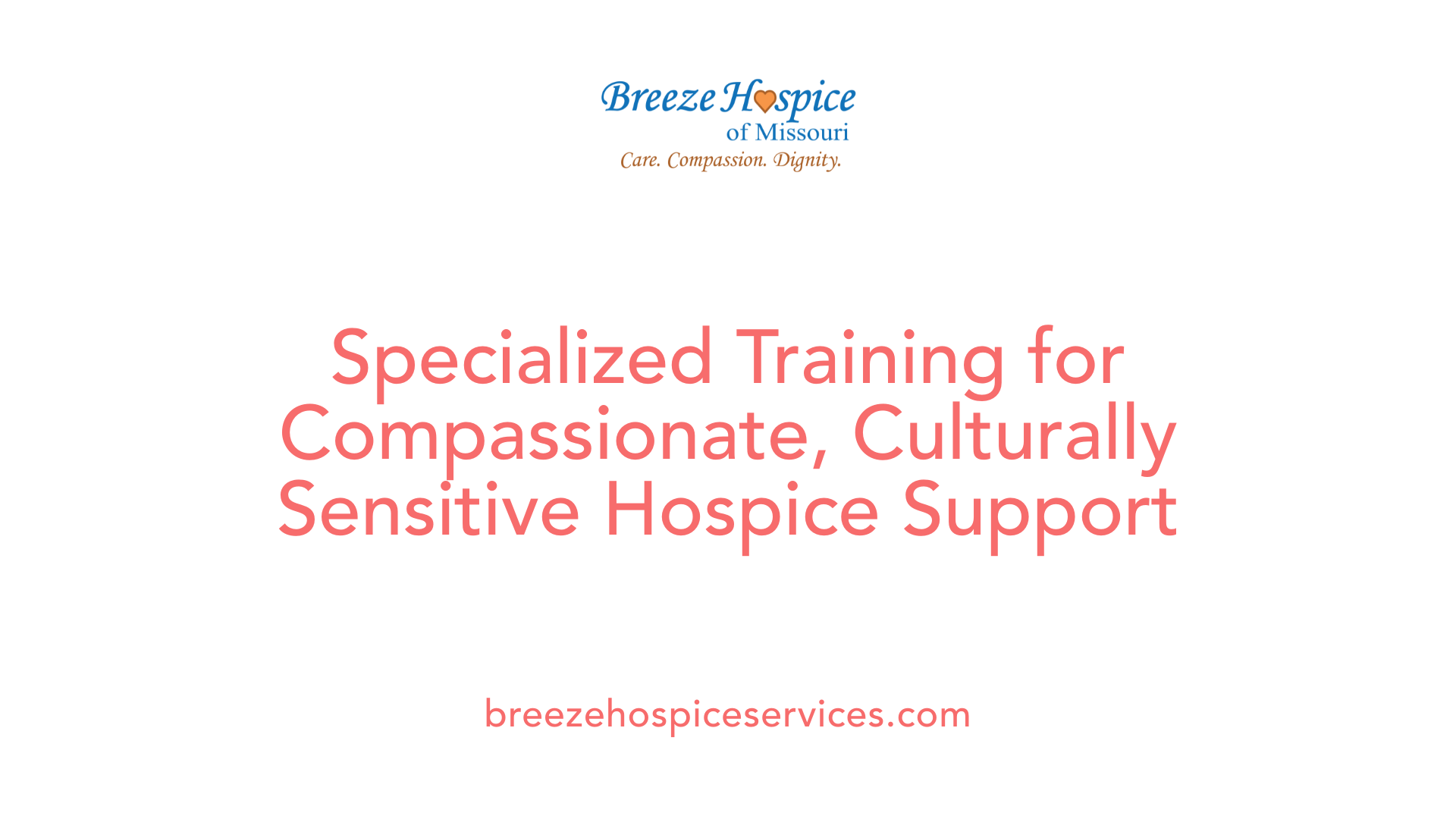
What training do healthcare providers receive to meet the unique end-of-life needs of veterans?
Healthcare providers who care for veteran patients at the end of life engage in specialized training designed to address the distinct physical, emotional, and cultural needs associated with military service. The Department of Veterans Affairs (VA) offers a comprehensive selection of VA-approved courses that cover essential topics such as military culture, exposure to hazardous environments, pain management, and opioid safety. These courses are accessible on the VHA TRAIN platform, ensuring that providers can learn conveniently and stay updated.
In addition to core courses, providers are required to complete the Community Care Provider–Opioid Safety Initiative training, which emphasizes safe medication practices. Further recommended training includes modules on suicide prevention and mental health support, essential for addressing issues like PTSD, depression, and survivor guilt prevalent among veteran patients.
VITAS Healthcare, a national hospice organization, supplements VA training with ongoing education initiatives. These include webinars, in-person training sessions, and a wide array of resources focused on effective communication within hospice care, understanding eligibility criteria, and incorporating veteran-specific considerations into care plans.
Altogether, these educational efforts aim to give healthcare professionals the skills necessary to deliver compassionate and culturally sensitive hospice care that respects veterans’ service and addresses their complex health challenges.
Incorporating Veteran Recognition and Honor in Hospice Care
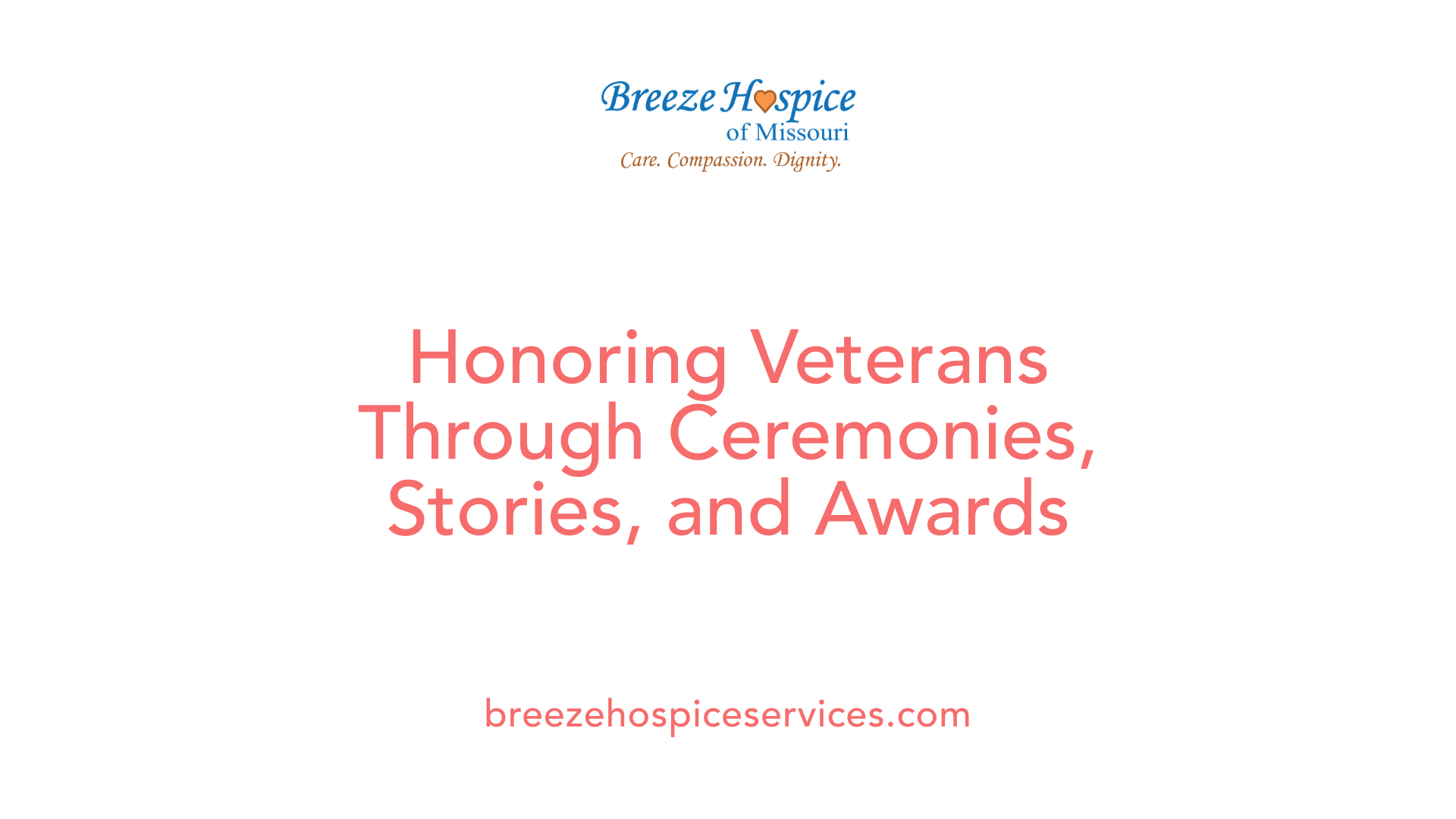 Hospice care for veterans emphasizes the importance of recognizing their military service with dignity and respect. This acknowledgment is integrated into care through a variety of ceremonies and programs designed to honor their sacrifices.
Hospice care for veterans emphasizes the importance of recognizing their military service with dignity and respect. This acknowledgment is integrated into care through a variety of ceremonies and programs designed to honor their sacrifices.
One prominent approach is the organization of pinning ceremonies and flag presentations. These events allow healthcare providers, family, and community members to publicly acknowledge a veteran's service, often featuring the presentation of medals, certificates, or patriotic symbols. For example, veteran pinning ceremonies are common, where care teams pin a symbol of appreciation on the veteran, which helps foster a sense of honor and remembrance.
Sharing veterans' stories is another meaningful aspect of hospice recognition efforts. Initiatives like the Veterans History Project encourage veterans to share their wartime experiences, which are then documented and preserved. This not only validates their service but also helps in emotional healing, enabling veterans to reflect and find peace.
Memorial services and commemorations also play a crucial role near the end of life. During these gatherings, caregivers and families honor veterans through community-wide events, such as Memorial Day ceremonies or Veterans Day observances. These events serve as platforms for collective appreciation, strengthening the veteran’s sense of belonging and legacy.
Additionally, many hospice programs provide certificates and military honors, such as plaques or medals, to recognize individual veterans’ service. These tokens of appreciation are often presented during care milestones or special events, providing a lasting reminder of the veteran's contributions.
Programs like 'We Honor Veterans' facilitate such recognition efforts by training staff and volunteers to engage in culturally sensitive practices. These initiatives promote respectful inquiry into veterans' military backgrounds, helping caregivers to better understand and meet their unique emotional and spiritual needs.
Overall, incorporating veteran recognition through ceremonies, storytelling, and honors helps preserve dignity, foster emotional well-being, and express gratitude for their service. This respectful acknowledgment is an essential component of holistic hospice care, ensuring that veterans at the end of life receive the respect and appreciation they rightly deserve.
Resources, Stories, and Education for Veteran-Focused Hospice Care
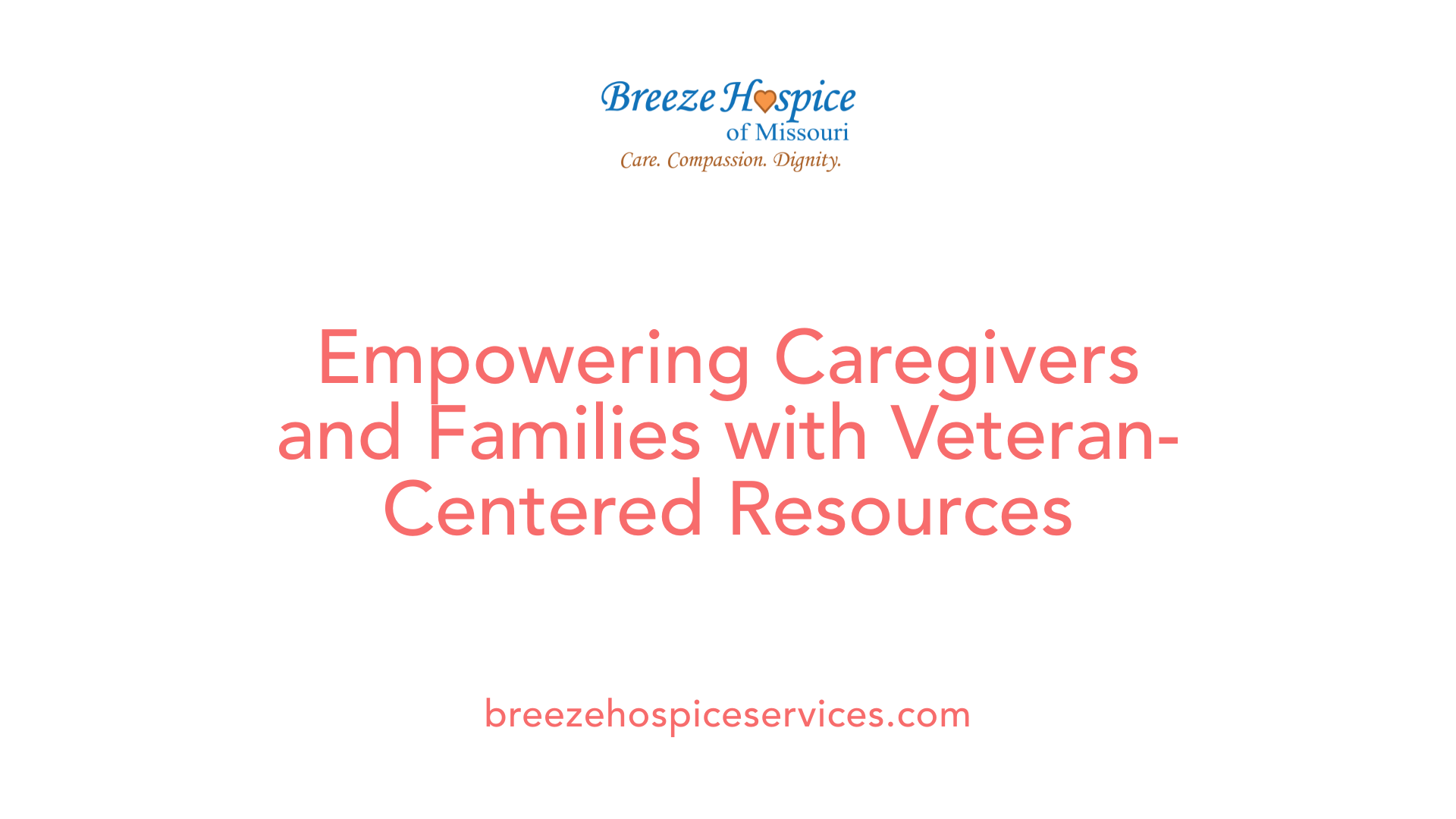
What resources and educational materials are available about hospice care tailored for veterans?
Numerous resources are dedicated to educating and supporting hospice care for veterans. The "We Honor Veterans" program stands out as a national campaign developed by the National Hospice and Palliative Care Organization (NHPCO) in partnership with the Department of Veterans Affairs (VA). This program offers webinars, guidelines, and best practices to help hospice providers deliver veteran-specific care that respects military history and culture.
The VA’s website provides extensive information on eligibility, benefits, and how veterans can access hospice services. It also shares resources like Veterans Resource Guides, which outline military benefits, burial options, and additional services available to veterans nearing the end of life.
Hospice organizations such as VITAS and MJHS have developed specialized training for their staff, focusing on understanding military backgrounds, trauma-informed care, and cultural sensitivity. These educational efforts include teaching staff how to facilitate veteran pinning ceremonies, recognize military memorabilia, and incorporate veteran-centered rituals.
Beyond training, many organizations produce educational materials tailored for families and caregivers, emphasizing respectful inquiry, emotional support, and addressing issues like PTSD and survivor guilt. Overall, these efforts aim to foster a compassionate, well-informed approach to hospice care that honors veterans’ service while addressing their unique physical, emotional, and spiritual needs.
Honoring Service with Compassionate, Personalized End-of-Life Care
Supporting veterans through hospice care requires recognizing their unique life experiences, health conditions, and cultural backgrounds. Programs like We Honor Veterans and partnerships with the VA foster an environment of respect, dignity, and healing. Training healthcare teams to understand military culture, providing individual and family-centered services, and incorporating veteran recognition activities are essential components of quality hospice care. Ultimately, these efforts ensure that the final chapter of a veteran’s life is marked by dignity, gratitude, and compassionate support, fulfilling a sacred duty to honor their service and sacrifice.
References
- Hospice Care - Geriatrics and Extended Care - VA.gov
- How Hospice Serves & Honors Veterans
- How Hospice Care Supports Veterans
- Unique Hospice & Palliative Care Needs for Veterans - Amedisys
- Specialized Palliative and Hospice Care and the Importance of ...
- Why Veterans May Need Specialized Hospice Care
- How Hospice Partnerships Care for Veterans
- Veterans in Hospice Care - Salus Homecare



































































































